Autocrats Will Benefit Most from Twitter's New Approach to State-Affiliated Media
E. Rosalie Li / Apr 7, 2023E. Rosalie Li is a researcher and recent interdisciplinary graduate from the Johns Hopkins Bloomberg School of Public Health.
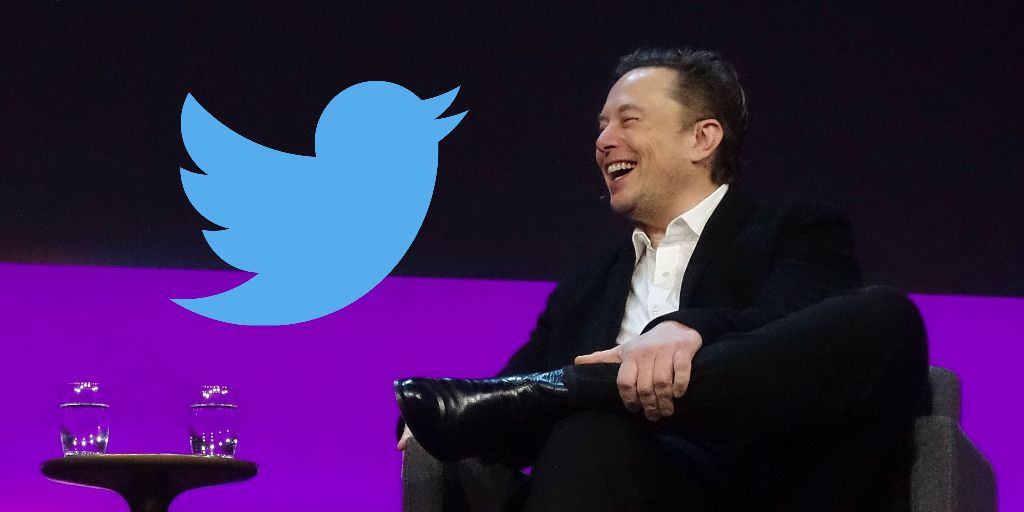
On April 4, Elon Musk's Twitter added a new label to the account for National Public Radio (NPR). The decades-old independent broadcaster is now classified as "state-affiliated."
The move came even though Twitter's policy said that funding from a government source alone does not warrant the label of "state-affiliated media," provided the outlet has editorial independence, as in the case of the BBC in the UK. Contrast that with outlets such as Russia's RT and Sputnik, where even employees have highlighted the lack of editorial freedom in these Kremlin-backed organizations, bolstering the case for their classification as "state-affiliated."
Twitter's (or perhaps more accurately, Musk's) seemingly arbitrary decision risks undermining the distinction between ethical, state-financed journalism and propaganda arms controlled by autocratic regimes. A gift to dictatorial leaders who hide behind claims of persecution, these corrosive changes occur in an increasingly hostile online environment, where censorship and suppression of free speech are major concerns. And, it raises serious questions about whether Musk is a responsible steward of such an important platform.
NPR and RT: Apples and Oranges
As of April 5, 2023, Twitter’s policy on “Government and state-affiliated” outlets still seemed to exclude an outlet such as NPR, which receives only a small portion of its budget from government sources:
“State-financed media organizations with editorial independence, like the BBC in the U.K. for example, are not defined as state-affiliated media for the purposes of this policy.”
What's more, historical archives show that NPR previously served as an example of an editorially independent, state-financed outlet on Twitter's policy website. After the NPR-mention was removed, Twitter edited the policy at least one additional time, removing the mention of BBC as well.
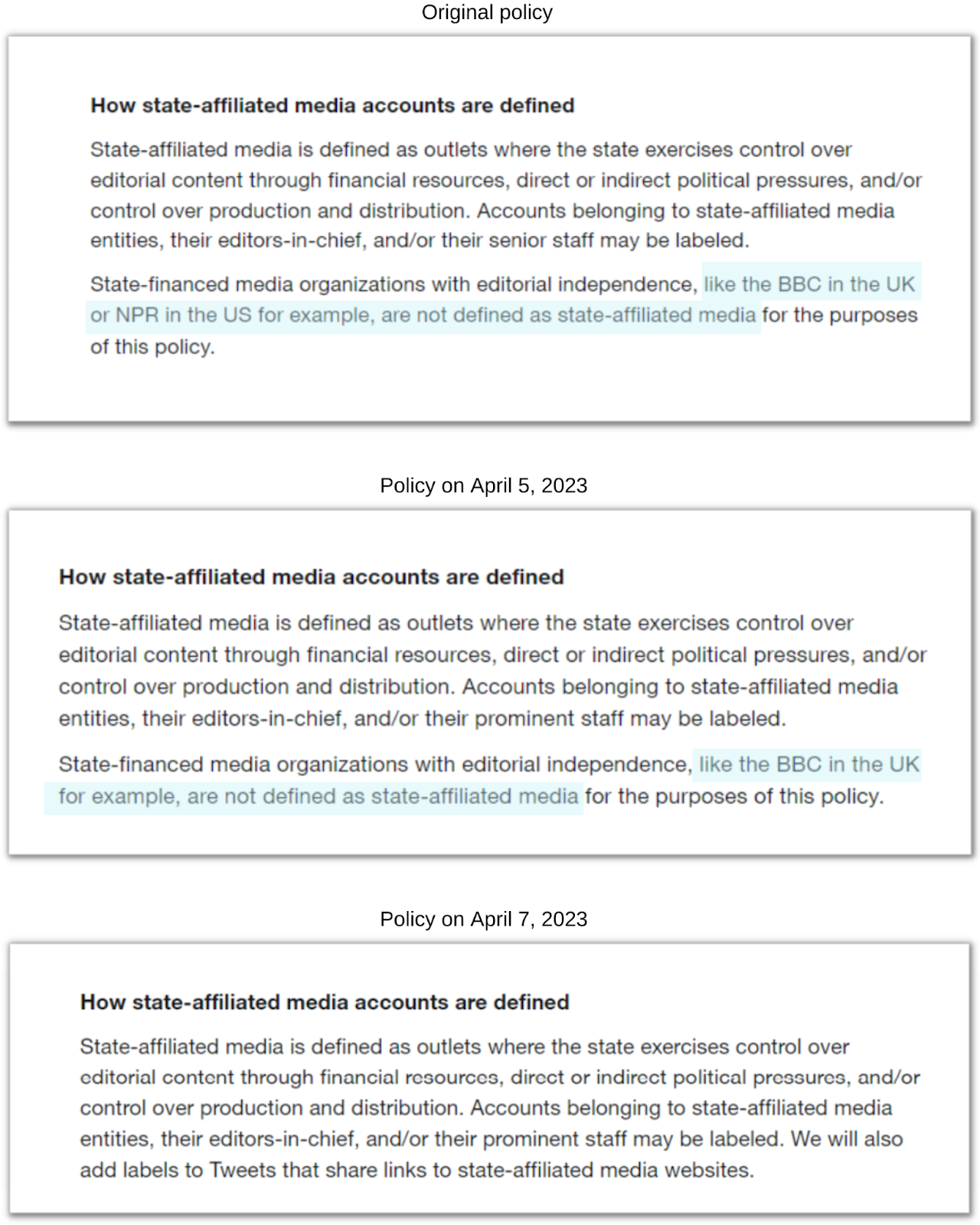
Outlets like RT and Sputnik earned the state-affiliated label by restricting editorial freedom. Interviews with dozens of former employees indicate RT is not simply a news outlet financed by the Russian Federation but part of Russia’s offensive propaganda strategy. RT Editor-in-Chief Margarita Simonyan revealed much about the outlet’s role when someone asked her why Russian taxpayers should support it financially:
“Well, about the same reason why the country needs the Ministry of Defense. Why do you need it as a taxpayer?”
The frankness of Simonyan’s response contrasted with those of Foreign Minister Sergei Lavrov. He decried the labeling of RT as “a major blow for freedom of speech and a denial of the rules of journalism.” The protestation overlooked Russia’s history of suppressing accurate reporting and the suspicious deaths of multiple independent journalists. These days, Russians face serious charges simply for publicly questioning the country's unprovoked invasion of Ukraine, even as state outlets spread falsehoods and the Kremlin's so-called "special military operation."
NPR’s financial records show that only 1% of its annual operating budget comes in the form of grants "from the Corporation for Public Broadcasting and federal agencies and departments.” That starkly contrasts with RT's state-controlled headquarters, ownership, and leadership. Likewise, Sputnik was created through a Presidential decree, and the Kremlin sets the editorial agenda. Journalists who don’t toe the line get let go. Some former employees have gone so far as taking to social media to apologize for “participation in the collective propaganda madness.” Quotes from former RT employees collected as a part of a larger study provide a window into such practices:
“I would say that in all, RT hire(s) inexperienced producers who they can mold in producing what kind of news they want and those who are less likely to put up a fight against certain editorial decisions.”
“People, who they hired then, were mostly young graduates who did not know anything about Russia…They didn’t know Russian at all – it was completely stupid.”
“Would they twist stories, or make facts, or reshape things, or twist a narrative? Absolutely. It’s less than about changing the story, just omitting facts. You take out key things and it will change the perspective that people will gain from the story and therefore it is misinformation. Other times they would report these unverified.”
“I asked my editor, what is RT’s line for this [Brexit], and he said: Anything that causes chaos is RT’s line.”
“They tried to make everyone sign [a] nondisclosure agreement. That was around Ukraine. It was for non-Russians. A lot of the foreign staff decided to leave at this point. They [RT] did not want anyone to say bad things about the company. After Liz Wahl and Sara Firth [see image below], they did not want any more people doing this. There was something in the contract before that was not enforceable abroad. That’s why they did that. They wanted something legally binding in the foreign journalists’ home countries.”
“Some of the stories were proven to be false at RT, but RT would give them a lot of airtime. I think there were stories about rapes and stuff like that in Germany that is caused by refugees … So, you see this shift from “freedom and balance” to “migrant crisis” that is destabilizing Europe.”
In contrast, NPR devotes considerable attention to addressing conflicts of interest and maintaining editorial independence. It holds all employees to its editorial policies, which expressly value honesty, fairness, and accuracy.
“NPR has editorial independence. Sure, they may have a moderate liberal bias, but that’s not because the government is telling them to report that way (if that were true, their bias would change according to the administration)," said Dr. Caroline Orr Bueno, a scholar at the University of Maryland who studies propaganda. "NPR’s reporting is not based on direction from the government, and they are not censored based on threats from the government."
A PR Win for the Kremlin
Dr. Ivana Stradner, a fellow at the Foundation for Defense of Democracies, agreed that NPR shouldn’t be labeled as “state-affiliated.” As an expert in information operations, Stradner sees how polarizing conversations benefit U.S. adversaries like Russia and China, and called on both U.S. political parties to condemn the move.
“The key is that both Democrats and Republicans address their audiences and explain the pitfalls of labeling NPR as a state-affiliated media,” said Stradner.
A cursory view of the media frenzy surrounding the change seems to support Stradner’s view. Both Russian and Chinese state-affiliated accounts took advantage of the opportunity.
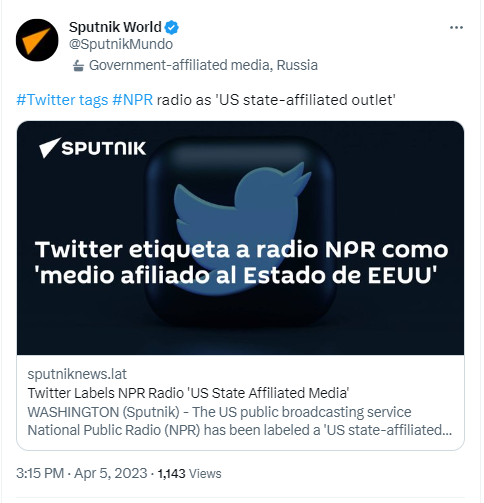
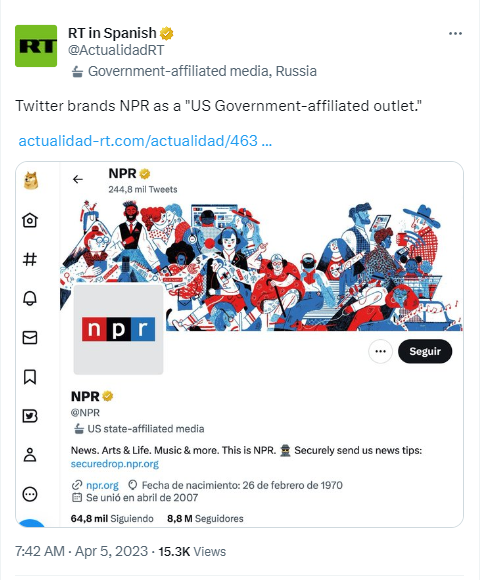
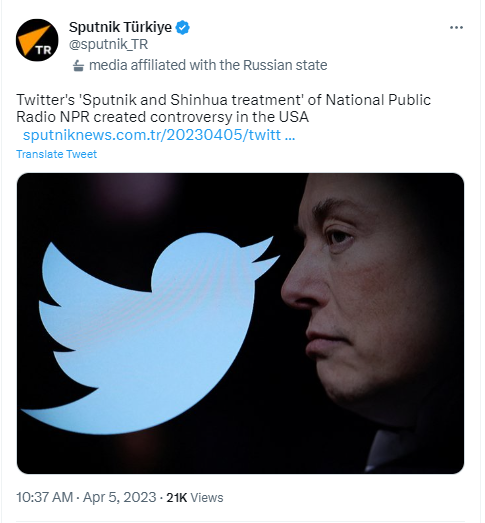
This underscores the gift Musk, perhaps unwittingly, bestowed upon not only the Kremlin but also the Chinese Communist Party, the Iranian State, and many other lesser-known tyrants. It comes at the expense of nearly every other stakeholder in this situation: credible media, the public, and likely even Elon Musk himself. A trustworthy media brand may see its perceived credibility harmed by sharing a classification with unscrupulous outlets. The public may mistakenly believe that RT and Sputnik are like NPR. The potential harm there could be lethal in a worst-case scenario, given the propensity of RT and Sputnik to spread mis- and disinformation, such as promoting unproven or unsafe medical treatments.
Alice Stollmeyer, the Executive Director of Defend Democracy, an organization that counters hybrid and technological threats, led a coalition of advocacy groups calling upon the Presidents of the EU Commission, Council, and Parliament to respond to the threats posed by unaccountable platforms in late 2022. Commenting on the labeling of NPR, Stollmeyer seemed frustrated.
“It’s absurd to use the Twitter label that was designed for autocracies’ state propaganda outlets like Russia Today for a democracy’s public service broadcaster. In democracies, public service media are (partly) state-financed media organizations using the so-called double firewall: full editorial independence and high journalism standards," she said. "These have nothing in common with autocracies’ state propaganda outlets. The former is quality journalism, the latter is a mix of propaganda, information manipulation, disinformation, and conspiracy theories. The former is a pillar supporting democracy; the latter is a weapon undermining democracy.”
Musk's Mercurial Leadership
Yesterday evening, NPR reported Musk had acknowledged the platform's label "might not be accurate," but as of this morning it remains. By obscuring the vital distinction between editorial independence and state affiliation, the platform—intentionally or not-–abets the agenda of autocrats.
Why Musk, who professed a desire to end censorship, would allow his platform to become an instrument of speech suppression is unclear. It reinforces concerns about his leadership, and it begs a larger question, asked by Stollmeyer:
“Why does the U.S. Congress allow digital platforms to be security threats that can easily be weaponized by adversaries like Russia and China?”
Why, indeed.
Authors
